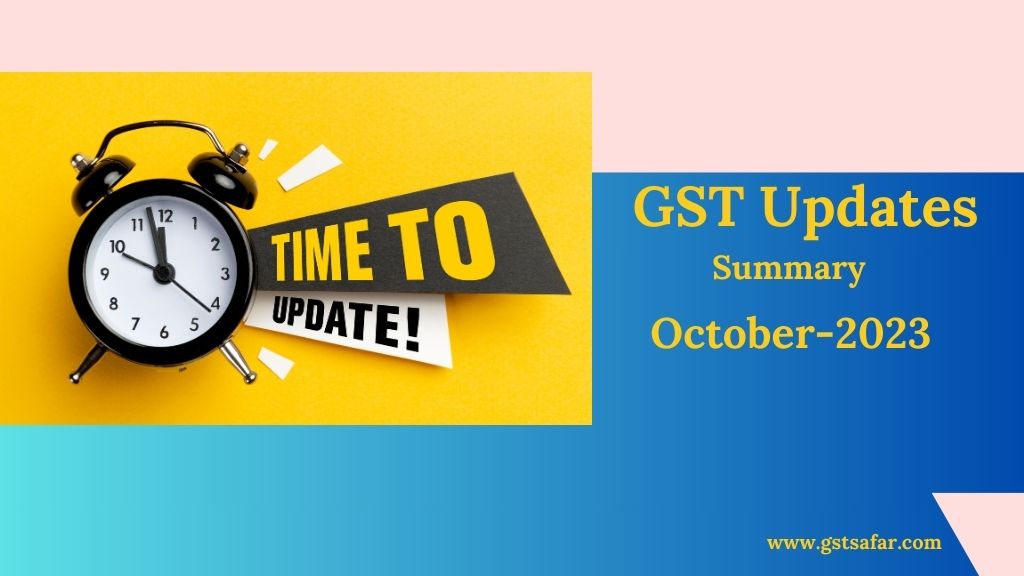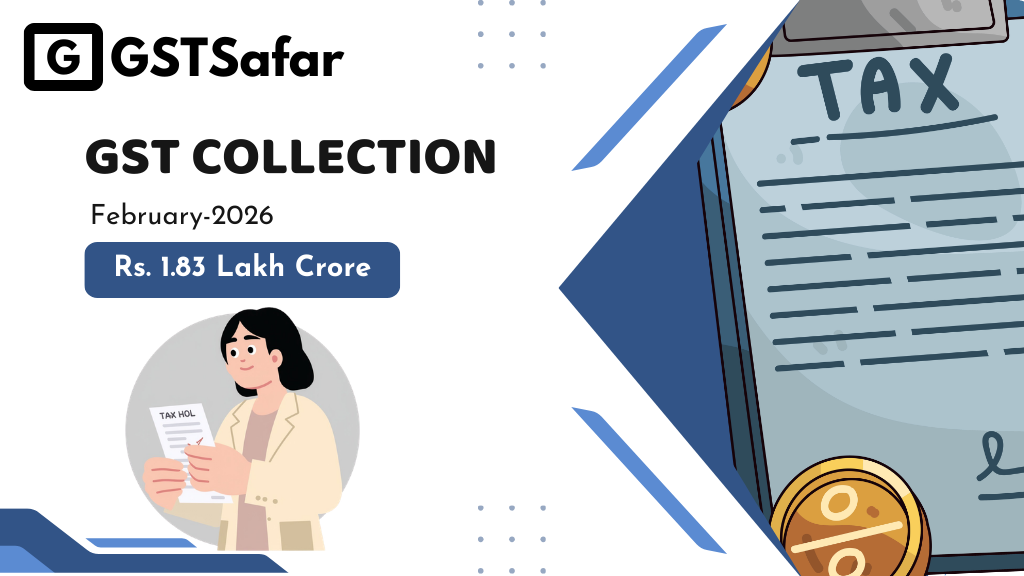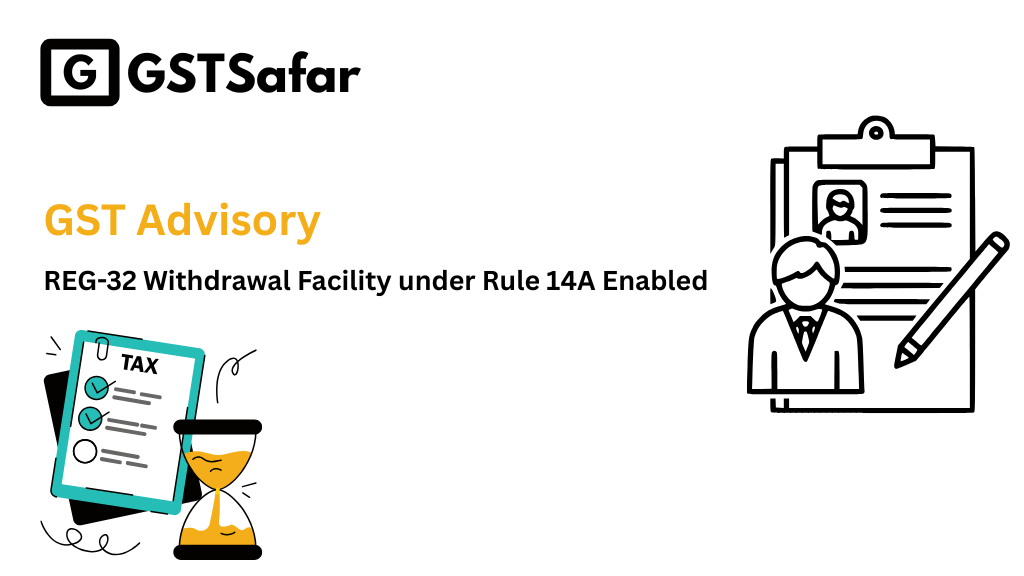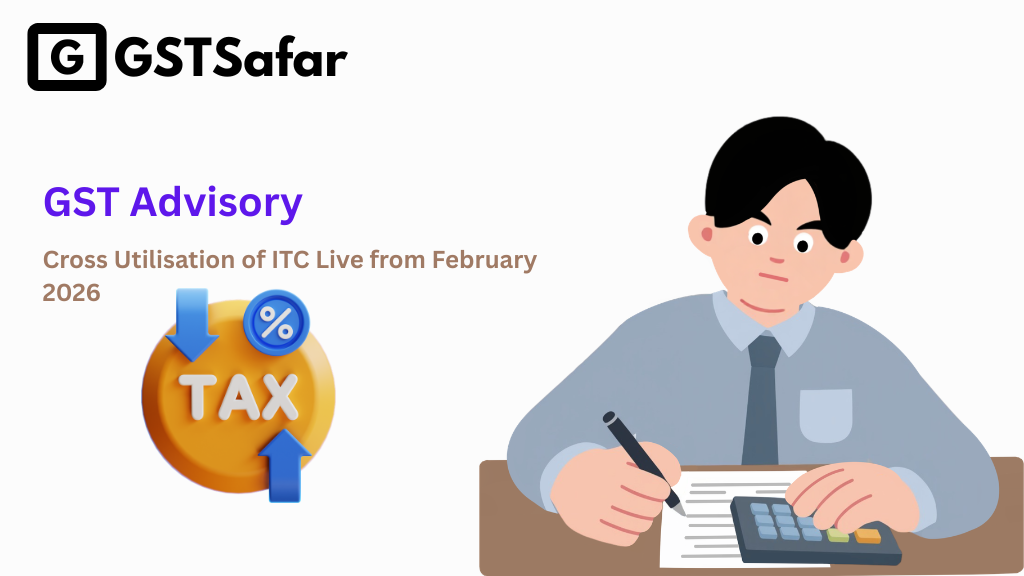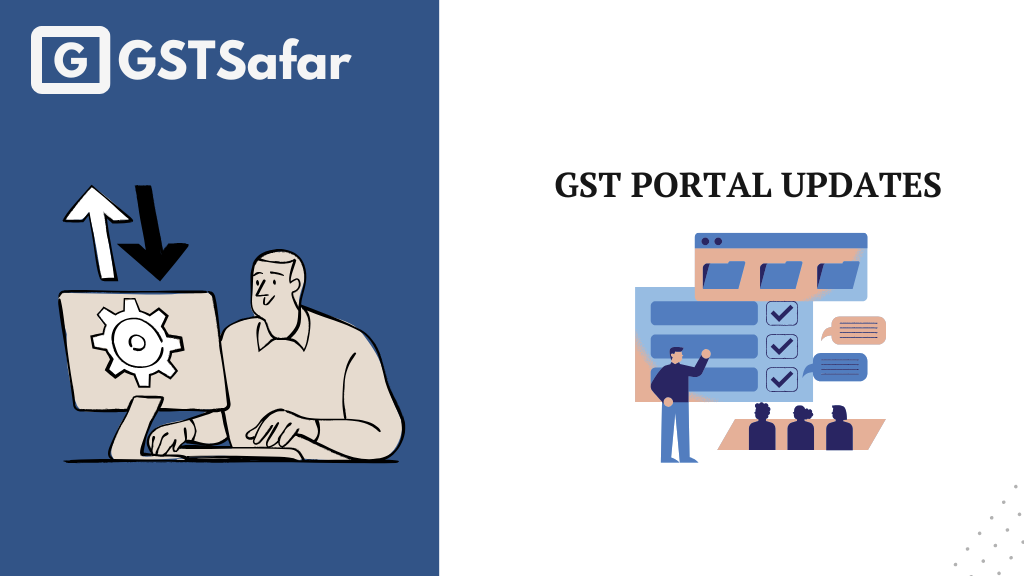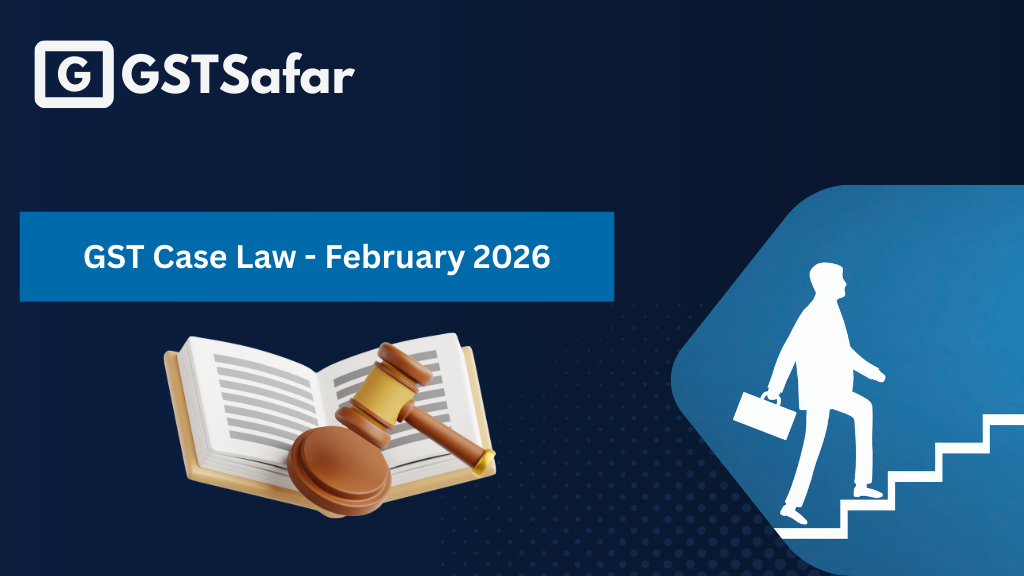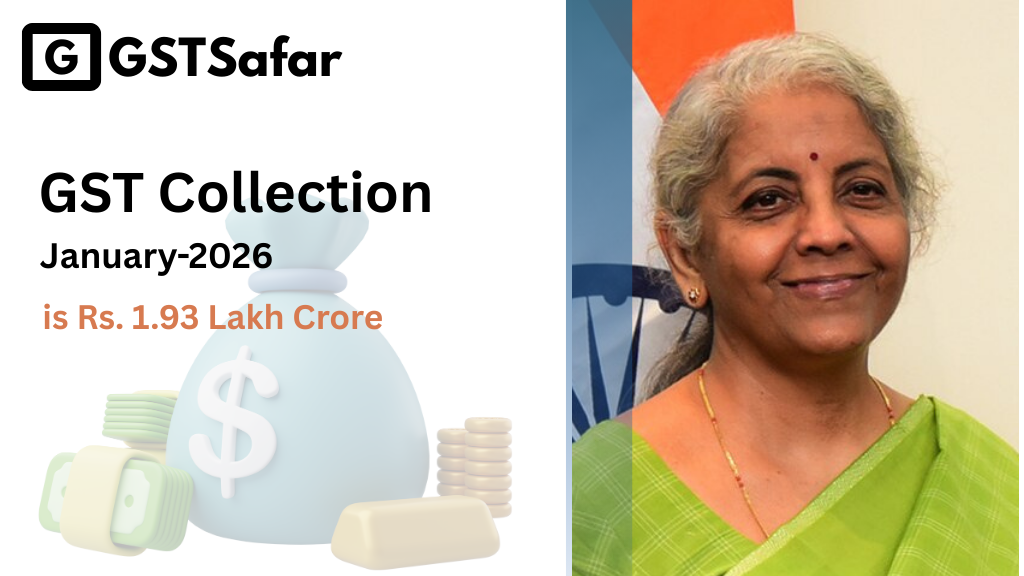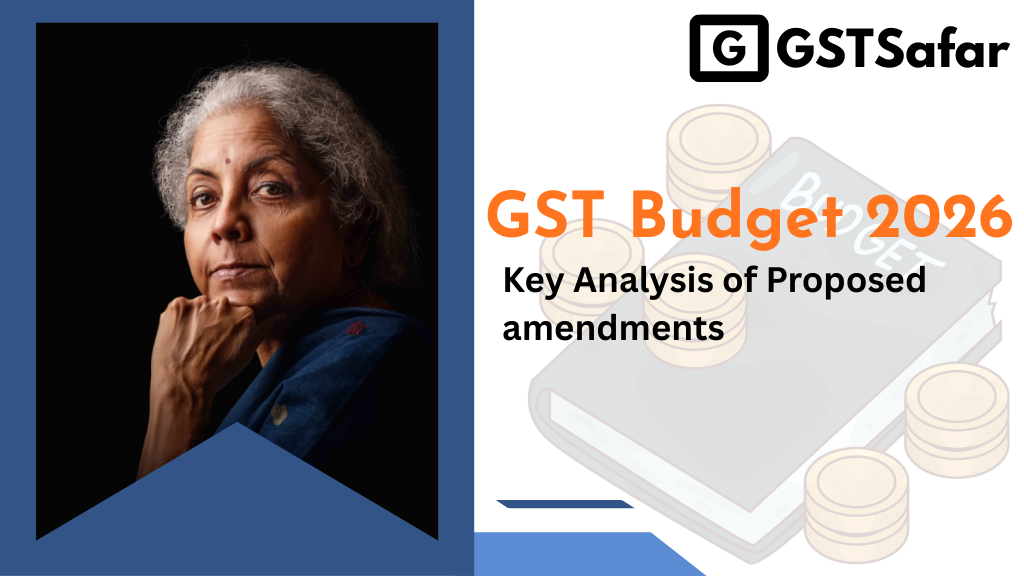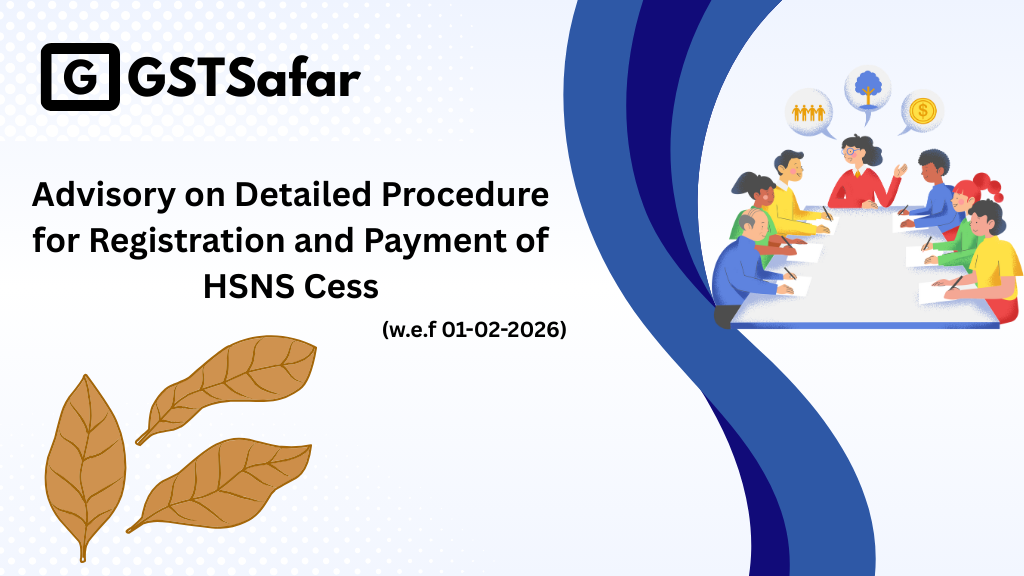This articles covers the latest gst updates summary October 2023. It contains all the Notifications and Circulars issued in October 2023 which covers all GST Updates in October 2023. All these amendments have been presented hear topic wise and reference of relevant latest gst notifications and latest gst circulars have been given at bottom of each topic. As well as, I have given our own analysis wherever it is necessary.
Limitation on GST Credit for Passenger Transportation Services at 2.5% Rate effective from 20-10-2023
- Heading No.9964 & 9966 :
In case of Transportation of Passenger of service & rental services of transport vehicles (with Operators) covered under Heading of 9964 & 9966, Supplier of input service in the same line of business cannot claim the ITC in excess of the rate charged at time of sale effective from 20-10-2023
Our Analysis:
Before this Notification issued it is like, if a person provides passenger transportation services using vehicle or Rental services of any motor vehicle includes the cost of fuel in the fare charging from customers, he can claim a tax credit for the input tax (tax they paid on goods and services) related to services you receive from other passenger transportation service providers or renting vehicles for this purpose.
So, he can get a tax benefit for services he buy from other companies in the same line of business.
After the Notification issued, Government has inserted one more Proviso effective from 20-10-2023 in Heading No.9964 –serial No.8 (vi) & Heading 9966- serial no.10 (i) with following words.
“Provided further that where the supplier of input service in the same line of business charges central tax at a rate higher than 2.5%, credit of input tax charged on the input service in the same line of business in excess of the tax paid or payable at the rate of 2.5%,shall not be taken.
In simpler terms, with effect from 20-10-2023 businesses offering passenger transportation services under the category of 9964 at a 2.5% GST rate or renting any motor vehicle under heading 9966 @ 2.5% GST rate having ITC with in same type of business can only claim a tax credit for the amount of GST they paid when buying goods and services. They cannot claim more than that amount as a credit when they sell their services. So, they can’t get back more GST than they originally paid on their expenses.
Let’s understand with the Example:
Illustration: ‘A’ engages ‘B’ for transport from New Delhi to Jaipur in a motor cab for Rs.1000. ‘B’, for supplying the said service, hires a motor cab with operator from ‘C’ for Rs.800. ‘C’ charges ‘B’ central tax at the rate of 6% (Rs. 48). If ‘B’ charges ‘A’ central tax at The rate of 2.5%, he shall be entitled to take input tax credit on the input service in the same Line of business supplied by ‘C’ only to the extent of Rs. 20 (2.5% of Rs. 800) and not Rs.48.”
Heading No.9996 –Serial No.34-(iv) :
| Before Notification | After Notification(effective from 20-10-2023) |
| Services provided by a race club | Services provided by a race club by way of licensing bookmaker in such club. |
Before notification issued in Heading No.9996-serial no.34 (iv) Race club offers services related to either a totalisator (a system for betting on horse racing) or provides licenses to bookmakers who operate within the club charged @ 14%.
The sentence is describing the services offered by a race club. These services include two main aspects:
Totalisator Services: This refers to the race club’s involvement in betting services. A totalisator is a system where people can place bets on horse races, and the race club manages this system.
License to Bookmaker: The race club also grants licenses to bookmakers. Bookmakers are individuals or entities that accept bets on races. So, the race club allows these bookmakers to operate within the club, likely for a fee or under certain conditions.
After issuance of Notification Government has omitted words “totalisator or a license to”.
It means before notification issued it emphasizes the service of granting licenses to bookmakers within the club. While the changes narrows the focus to just the act of licensing bookmakers within the race club with effect from 20-10-2023.
As a result of above changes, Government has omitted following entries in the Notification No.11/2017 dated 28-06-2017 Annexure: Scheme of Classification of Services:
| Serial No. | Service Code (Tariff) | Service Description |
| 696 | 999692 | Gambling and betting services including similar online services |
| 698 | 999694 | Lottery services |
Certain changes in exemption of services effective from 20-10-2023
- With Effect from 20-10-2023 Exemption is granted to services provided to Governmental Authorities by way of:
- Water supply
- Public Health
- Sanitation Conservancy
- Solid Waste Management
- Slum Improvement/Upgradation
Our Analysis:
Government has amend the notification no.12/2017-Central tax (Rate) by adding serial No.3B in notification to provide one more exemption effective from 20-10-2023.
| Serial No | Chapter/section/Heading/Service code | Description of services | Rate | Condition |
| 3B | Chapter-99 | services provided to Governmental Authorities by way of 1.Water supply 2.Public Health 3.Sanitation Conservancy 4.Solid Waste Management 5.SlumImprovement/Upgradation | Nil | Nil |
- Forward Charge Mechanism for Indian railways effective from 20-10-2023:
Government has amend the Notification No.12/2017-Central tax (Rate) dated 28-06-2017 effective from 20-10-2023 with following:
- In serial no.6, in column No. (3), in item (a) after the words “Department of Posts” the words “the ministry of Railways (Indian Railways) shall inserted.
Before the amendment it is like services provided by the Central Government, State Government, Union territory, or local authorities are covered under exemption but excluding following services:
(a) Services by the Department of Posts:
(b) Services in relation to an aircraft or a vessel, inside or outside the precincts of a port or an airport
(c) Transport of goods or passengers
(d) Any service, other than services covered under entries (a) to (c) above, provided to business entities
After amendment in notification with effect from 20-10-2023, Government has added the words Ministry of Railways (Indian Railways) which means:
Service provided by government excluding:
(a) Service by the department of Posts and the Ministry of Railways
(b) Services in relation to an aircraft or a vessel, inside or outside the precincts of a port or an airport
(c) Transport of goods or passengers
(d) Any service, other than services covered under entries (a) to (c) above, provided to business entities
In simple words, Service provided by government related to postal services, Ministry of Railways (effective from 20-10-2023) and services related to transportation, service other than (a) to (c) are not subject to exemptions.
2. In serial no.7, in column No. (3), in the explanation, in item (a) after the words “Department of Posts” the words “the ministry of Railways (Indian Railways) shall inserted.
Before the amendment exemption is available on Service provided by Central Government, State Government, Union Territory, or local authority to a business that had a low turnover in the previous financial year, low enough to not need registration under the Central Goods and Services Tax Act, 2017. However, this exemption does not apply to:
a) Services provided by the Post Office services related to airplanes or ships near ports or airports, and transportation services for goods or passengers.
(b) Renting out property services. services, like postal services and property renting
After the amendment exemption does not apply to
(a) Services provided by the Post Office, Indian Railways, services related to airplanes or ships near ports or airports, and transportation services for goods or passengers.
(b) Renting out property services.
3. In serial no.8, in column No. (3), in the Proviso, in item (i) after the words “Department of Posts” the words “the ministry of Railways (Indian Railways) shall inserted.
Before the amendment it is like:
Exemptions are available when CG, SG, UT, or LA provides services to another CG, SG, UT, or LA, but these exemptions do not apply to postal services, services related to airplanes or ships, or transportation services.
After the amendment exemption is available when CG, SG, UT, or LA provides services to another CG, SG, UT, or LA, but these exemptions do not apply to postal services, Ministry of Railways (Indian railways) (Effective from 20-10-2023), services related to airplanes or ships, or transportation services.
4. In serial no.9, in column No. (3), in the first Proviso, in item (i) after the words “Department of Posts” the words “the ministry of Railways (Indian Railways) shall inserted.
Before the amendment exemption is available when services provided by the Central Government, State Government, Union territory, or a local authority where the cost of the service is less than five thousand rupees. However, there are exceptions to this rule:
The exemption doesn’t apply to services provided by the Department of Posts.
It doesn’t apply to services related to aircraft or vessels, whether inside or outside ports or airports.
It doesn’t apply to the transportation of goods or passengers. Additionally, If the government provides a service continuously throughout the year (like an ongoing service), the exemption (meaning the special rule) applies only if the total payment for that service in a financial year does not exceed five thousand rupees
After the amendment exemption does not apply to postal services, Ministry of Railways (Indian railways) (effective from 20-10-2023), transportation services, or services related to airplanes or ships. If a service is provided continuously, the exemption applies only if the total payment for that service in a year is less than five thousand rupees.
Ministry of Railways Now Subject to Forward Charge Mechanism from 20-10-2023
With Effect from 20-10-2023, Indian Railways are now covered under the Forward charge mechanism for any supplies by them.
Our Analysis:
- Government has amend the Notification No.13/2017-Central tax (Rate) dated 28-06-2017 effective from 20-10-2023 with following:
- In serial no.5, in column No. (2), in item (i) after the words “Department of Posts” the words “the ministry of Railways (Indian Railways) shall inserted
Before the amendment: RCM is applicable on the service provided by government to business entity but for service related to renting of immovable property, postal services, Services related to airplanes or ships, whether they are inside or outside the area of a port or an airport , transportation of goods or passengers RCM will not applicable. FCM will apply on such services.
After the amendment:
RCM is applicable on the service provided by government to business entity but for service related to renting of immovable property, postal services, service by Ministry of Railway, Services related to airplanes or ships, whether they are inside or outside the area of a port or an airport, transportation of goods or passengers, RCM will not applicable. FCM will apply for such services.
2. Effective from 20-10-2023, In serial no.5A, in column No. (2), after the words “Services supplied by the Central Government” the words “excluding the ministry of Railways (Indian Railways) shall inserted.
Before the amendment
When the Central Government, State Government, Union Territory, or local authority rents Immovable property to someone who is registered under the Central Goods and Services Tax Act of 2017, RCM will applicable on such transaction.
After the amendment
Central Government excluding the ministry of Railways (Indian Railways), state Government, Union territory or local authority supplies the service related to renting of immovable property to any person registered under CGST Act 2017 liable for RCM.
Government has amend the Notification No.04/2017-Central tax (Rate) dated 28-06-2017 effective from 20-10-2023 with following:
| Before the amendment | After the amendment (effective from 20-10-2023) |
| If Central government, state government , Union Territory, local authority supplied any Used vehicles, seized and confiscated goods, old and used goods, waste and scrap to any registered person RCM is applicable on such transactions. | If Central government (Excluding Ministry of Railways (Indian Railways), state government or Union Territory or local authority supplied any Used vehicles, seized and confiscated goods, old and used goods, waste and scrap to any registered person RCM is applicable on such transactions. |
RCM will not applicable to ministry of Railways if it supplied used vehicles, seized and confiscated goods, old and used goods, waste and scrap to any registered person as Indian Railway is out of the purview of RCM. FCM will applicable to Indian Railways.
No refund of accumulated ITC in case of Builder
Government has amend notification No.15/2023-Central Tax (Rate) by changing certain words which is effective from 20-10-2023.
In simple words, the government is saying that if you’re in the business of constructing and selling buildings or parts of buildings, and you’ve included the cost of the land in what you charge your customers, you won’t get a refund for any unused tax credit you may have. Even if you’ve received all the payment for your construction work either after the government has approved your construction project by issuing completion certificate or after someone has started living or working in the building, whichever happens first.
By this amendment government has fixed that with effect from 20-10-2023, No refund of accumulated ITC for service specified above so in future there may not have any litigation for the same.
Certain changes in Transportation of passenger through e-commerce operator using Omni-Bus
Government has amend the Notification No.17/2017-Central tax (Rate)-dated 28-06-2017 related to the cases where E-Commerce operator is liable to pay the tax on the services supplied through it applicable from 20-10-2023.
In the clause (i) words “any other motor vehicle except omnibus is substituted. It means service of transportation of passenger by radio Taxi, motor cab, and Maxi-cab, motor cycle or any other motor vehicle except omnibus supplied through E-commerce Operator then e-commerce operator will liable to pay the tax.
But government has added one more clause that is clause (ia) for omnibus applicable from 20-10-2023. It says if service of transportation of passenger is provided through e-commerce operators then e-commerce is liable to pay tax but if the person is company who supplied transportation of passengers services through e-commerce operator using omnibus then company will liable to pay the taxes effective from 20-10-2023.
In the Explanation after (c) clause following is inserted:
“Company” has the same meaning as assigned to it in clause (20) of section 2 of the Companies Act, 2013 (18 of 2013).
Changes in Rate of Goods effective from 20-10-2023
| Serial No | Product Description | HS | Form of Sale | GST Rates (Effective from 20-10-2023) | Remarks |
| 92A | Molasses | 1703 | 5% | GST Rate reduced from 28% to 5% | |
| 94A | Food preparation of millet flour in powder form (Contains at least 70% Millet) | 1901 | Other than pre-packaged & labeled | 0% | By notification No.18/2023 |
| 96A | Food preparation of millet flour in powder form (Contains at least 70% Millet) | 1901 | Pre-packaged & labeled | 5% | |
| 25A | Spirits for Industrial use | 220710 12 | 18% |
No Refunds for Polyester Film used in preparation of Imitation Zari Yarn” effective from 20-10-2023
No refund on Polyester film or plastic film used in preparation of imitation Zari thread or Yarn under inverted duty structure with effect from 20-10-2023.
| Serial No | Product Description | HS | Form of Sale | Remarks |
| 6AA | Imitation Zari Thread/Yarn | 5605 | Made from metallised polyester film/plastic film | Explanation: This Entry shall apply for refund of input tax credit only on polyester film/ plastic film |
Our Analysis
Notification No.05/2017-Central tax (Rate) dated 28-06-2017 states that No refund of unutilized ITC is available where rate of tax on input is more than rate of tax on the output.Government has insert the above entry of 6AA for imitation Zari thread or Yarn made out of Metalised polyester film/ plastic with explanation.Explanation of the above entry says that refund is not allowed on purchase of polyester film or plastic film in the preparation of imitation Zari thread or Yarn with effect from 20-10-2023.
E.g. if Imitation Zari thread or Yarn made out of 4 Different things. Out of 4 if one is Polyester film or plastic film then refund will not be allowed on polyester film or Plastic film from 20-10-2023. On the remaining 3 items refund will allowed if it not fall under the Notification No,05/2017 criteria.
Clarification on Export Payments in INR Vostro Accounts
| Clarification Topic | Details |
| Issue Clarified | The clarification is about whether receiving payments in Indian Rupees (INR) in Special Vostro accounts, as allowed by the Reserve Bank of India (RBI), counts as exporting services under the Integrated Goods & Services Tax Act, 2017 (IGST Act). |
| Legal Provisions | The IGST Act outlines five conditions for a service to be considered an export. One of these conditions (sub-clause (iv)) specifies that payment for the service must be received in convertible foreign exchange or INR as permitted by RBI. |
| RBI Circular | The RBI has a circular that allows trade settlements in INR through Special Vostro Accounts. This means Indian exporters can receive export proceeds in INR from these accounts. |
| Foreign Trade Policy (FTP) | The Foreign Trade Policy (FTP) 2023 also supports this, stating that payments and settlements in INR are permissible as per RBI’s circular. |
| Clarification Conditions | INR export proceeds from Special Vostro Accounts meet IGST Act condition (iv). In simple terms, if Indian exporters receive INR payments from Special Vostro accounts opened by correspondent banks of partner countries, as allowed by RBI and FTP 2023, it fulfills the conditions of the IGST Act regarding payment for exported services. |
| Approval Conditions | This clarification ensures that when exporters follow these guidelines, their services can be considered exports under the IGST Act, subject to any additional conditions mentioned in FTP 2023 and RBI Circulars, and without conflicting with other legal requirements. |
Meaning of Vostro Account
A Vostro account is a type of account that banks use for holding funds on behalf of another bank or financial institution. Essentially, it’s an account maintained by a bank for another bank. The term “Vostro” comes from Latin and means “yours” in English, indicating that the account belongs to the other bank. In the context of international trade and finance, Vostro accounts are often used for facilitating transactions between banks in different countries. For example, if Bank A in India has a Vostro account with Bank B in the United States, Bank A can deposit funds into this account with Bank B to facilitate transactions or settlements related to international trade or remittances. These accounts help banks manage their international operations and facilitate smooth financial transactions across borders.
Clarification regarding determination of place of supply in various cases
| Issue | Clarification |
| A. Place of supply for transportation | Starting from October 1, 2023, for transportation services (except mail and courier) where either the service provider or the recipient is outside India: If the recipient’s location is known, the place of supply will be where the recipient is. If the recipient’s location isn’t known as part of normal business, then the place of supply will be where the service provider is. For Mail and Courier: Before this change, mail and courier services weren’t specifically covered. Now, they will follow the same rule: If the recipient’s location is known, the place of supply for mail and courier services will be where the recipient is. If the recipient’s location isn’t known as part of normal business, then the place of supply will be where the service provider is. |
| B. Place of supply for advertising | Clarification provided for cases where space is sold for advertising on hoardings/structures. Place of supply is where the hoarding/structure is located. For services where no space is sold, but only visibility is provided, place of supply is determined based on Section 12(2) of the IGST Act, which considers the location of the recipient of the advertising service. |
| C. Place of supply for co-location | What are Co-location Services? Co-location services are like renting space in a data center. Businesses can rent space to keep their servers and computer hardware. They also get services like security, air conditioning, power backup, and network connectivity to keep their systems running smoothly. |
| Understanding the Issue: The question is whether co-location services should be seen as just renting space (like renting a house) or as a package of services that include hosting servers and providing IT infrastructure (like getting internet and utilities along with renting a house). | |
| Clarification on Place of Supply: If the co-location service is just renting space and basic infrastructure (like power and air conditioning), then the place of supply is where the data center is located. This follows the standard rule for renting immovable property. However, if the co-location service includes hosting servers, providing network connectivity, security, and other IT infrastructure services, then it’s not just about renting space. In such cases, the place of supply is where the recipient of the service (the business renting the space) is located. In simpler terms, if you’re just renting space, the place of supply is where the data center is. But if you’re getting a package of IT services along with the space, then the place of supply is where your business is located. |
Clarification on issue relating to Personal Guarantee and corporate guarantee
People in the trade and field formations have asked for clarity regarding the tax implications when:
1. Directors provide personal bank guarantees to banks to help their company get credit.
2. A related individual or a holding company gives a corporate guarantee to banks or financial institutions either for another related individual or for its subsidiary company, respectively.
To ensure consistency in how the law is applied everywhere, the Board, using its authority under section 168 (1) of the Central Goods and Services Tax Act, 2017 (CGST Act), is providing clarifications on these issues.
| Issue clarification | Summary |
| 1. Personal Guarantee by Director | Supply of Service: Providing a personal guarantee by a director to a bank/financial institution for credit facilities is treated as a supply of service under the CGST Act. Taxability: GST is applicable even if no consideration is involved, as per Schedule I of the CGST Act. Taxable Value Determination: Taxable value is determined using Rule 28 of the CGST Rules, typically based on the open market value. However, in scenarios where no consideration can be paid (as mandated by RBI), the taxable value may be considered as zero, leading to no GST liability. |
| 2. Corporate Guarantee by Related Persons | Supply of Service: Providing a corporate guarantee by a company or holding company to a bank/financial institution for credit facilities is considered a supply of service between related parties, as per Schedule I of the CGST Act, even without any consideration. Taxability: Such supply of services is taxable under GST, following Rule 28 of the CGST Rules for determining the taxable value. Valuation: A new sub-rule (2) in Rule 28 ensures uniformity in determining the taxable value for such supply of services between related persons, irrespective of full Input Tax Credit availability. The taxable value is determined based on this sub-rule. Exception: The valuation method under sub-rule (2) of Rule 28 doesn’t apply to personal guarantees provided by directors, which are valued as explained in the previous section. |
Certain changes in CGST Rules,2017
- Rule 28 of CGST Rules, 2017 is for determining the value of goods or services supplied between parties who are related or distinct other than through an agent.
As per sub rule (1) the value of supply of goods or services or both shall be
Open Market Value: Initially, the value should be the open market value of the supply.
Goods/Services of Like Kind: If there’s no open market value, then it should be the value of similar goods or services.
Use Specific Rules: If neither of the above can be determined, then the value should be found using rule 30 or rule 31, in that sequence.
Above specified methods will not apply:
- if the goods are going to be sold as they are (without any modifications), the seller (supplier) has the option to decide the value of these goods in a specific way:
The value can be set at 90% of the price that the buyer will charge when they sell those goods to their own customers, as long as those customers are not related to the buyer
2. Where the recipient is eligible for full input tax credit, the value declared in the invoice shall be deemed to be the open market value of the goods or services.
Government has added following sub rule in rule 28 of CGST Act, 2017:Notwithstanding anything contained in sub-rule (1), the value of supply of services by a supplier to a recipient who is a related person, by way of providing corporate guarantee to any banking company or financial institution on behalf of the said recipient, shall be deemed to be one per cent of the amount of such guarantee offered, or the actual consideration, whichever is higher.
In simple words it means:
Even if the first rule (sub-rule (1)) says something else, when a company provides a corporate guarantee to a bank or financial institution for a related company, the value of this service is set in a specific way. It’s either:
1% of the total amount guaranteed, OR
The actual payment received for providing this guarantee. Whichever of these two amounts is higher will be used as the value for the service.
- Rule 142 of CGST Rules, 2017 is related to notice and order of demand of amount payable.
The government made changes to Rule 142 of the CGST Act, specifically in sub rule (3). Earlier, the proper officer used to issue an order after receiving payment. Now, they issue an intimation instead.
Here’s what it means:
Payment Notification: If someone owes taxes and pays them within 30 days of getting a notice (as per section 73(8) or 74(8)), or pays a specific amount mentioned in section 129(1) within seven days of getting a notice, they need to inform the tax officer using “FORM GST DRC-03.”
Intimation Instead of Order: After receiving this payment information, the proper officer now sends an intimation in “FORM GST DRC-05.” This intimation marks the end of issues related to the original notice, replacing the earlier practice of issuing an order.
So, the main change is that instead of issuing an order, the proper officer now sends an intimation after being informed about the payment, effectively closing the matter related to the original notice.
- Rule 159 of CGST Rules, 2017 is related to Provisional attachment of property.
The Government made changes to Rule 159 of CGST Act, specifically in sub rule (2).
Earlier, Only the Commissioner’s written permission could lift the restriction. Now the restriction will be lifted either with the Commissioner’s permission or after one year from the order issuance, whichever comes first.
As per Rule 159(2) the Commissioner sends a copy of the attachment order (FORM GST DRC-22) to relevant authorities to formally restrict the specified property.
The restriction on the property can be lifted in two ways:
With the Commissioner’s written permission.
If one year has passed since the order was issued.
In Simple Words, Rule 159 originally required the Commissioner’s permission to lift property restrictions. After the amendment, these restrictions can also be lifted With earlier of the Commissioner’s written permission or one year has passed since the order was issued.
- Form GST REG-01 :
Form GST REG-01 is related to application for registration Government has added one more constitution of business in Part-B under serial No.2 after clause (xiva) “One Person Company”.
Form GST REG-08 substituted
Clarification regarding GST Rate on imitation zari thread or yarn
| Clarification on GST Rate for Imitation Zari Thread or Yarn | |
| 1. GST Rate Reduction | The GST Council, in its 50th meeting, recommended reducing the GST rate to 5% on imitation zari thread or yarn. This recommendation led to the insertion of Sl. No. 218AA in Schedule I of notification no. 1/2017- Central Tax (Rate) dated 28.6.2017. |
| 2. Doubts and Clarification | Doubts were raised regarding whether metal-coated plastic film converted to metallised yarn and twisted with other yarns falls under Sl. No. 218AA (5% GST) or Sl. No. 137 (12% GST) of Schedule III. The GST Council clarified that imitation zari thread made from metallised polyester/plastic film under HS 5605 falls under Sl. No. 218AA (5% GST). |
| 3. Refund Clarification | The GST Council also specified that no refund would be permitted on polyester film (metallised)/plastic film due to the inversion of tax rates. Changes reflecting this clarification were made in notification no. 5/2017- Central Tax (Rate) through Notification no. 20/2023-Central Tax (Rate) dated 19.10.2023. |
Clarification on applicability of GST on certain services
| Issue on Clarification | Summary |
| Inclusion of Leasing in “Same Line of Business” | Leasing motor vehicles without operators (SAC 9973) is not considered in the “Same Line of Business” for GST purposes. It attracts GST at standard rates, not the 5% rate applicable to passenger transport and renting with operators. |
| GST on Electricity Reimbursements | Electricity supplied along with renting immovable property forms a composite supply and is taxed at the rate applicable to renting. Even if billed separately, it’s part of the composite supply. However, if supplied as a pure agent or at actual utility rates, it’s not considered part of the value of supply. |
| GST Rate for Job Work on Barley to Malted Barley | Job work services for converting barley into malt are classified under “job work in relation to food and food products,” attracting a GST rate of 5%. |
| DMFTs Eligibility for GST Exemption | District Mineral Foundations Trusts (DMFTs) set up by State Governments are considered Governmental Authorities and are eligible for the same GST exemptions as other Governmental Authorities. |
| GST Exemption for Horticulture Services to CPWD | Services and composite supplies (where goods’ value is ≤25%) related to horticulture provided to CPWD are exempt from GST under specific notifications. |
Read similar article
